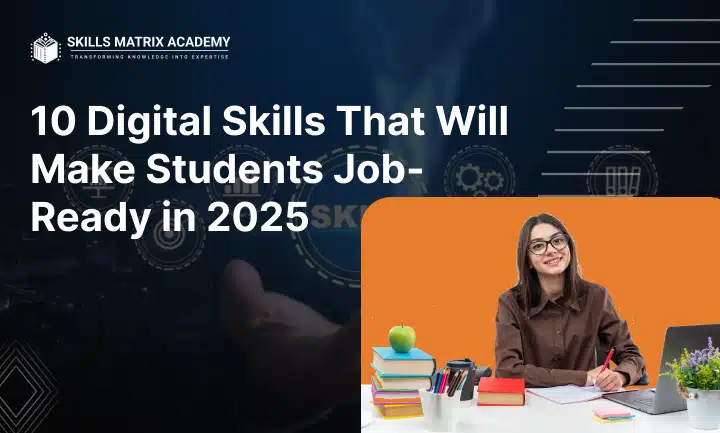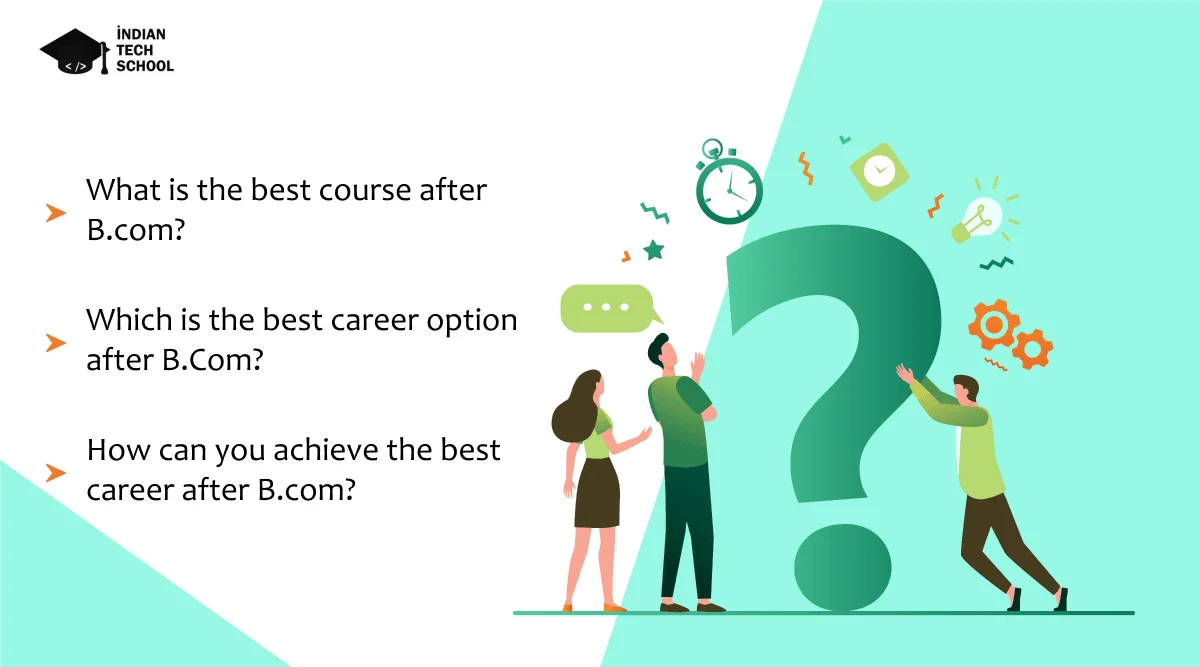The Industrial Revolution 2020 has created a huge demand for digital skills. Careers in automation, AI, and machine learning are growing fast. Traditional degrees alone are no longer enough.
Students can gain a head start with a digital marketing course or an SEO course. These courses teach practical skills for student career growth and meet the digital skills requirements of major companies.
In India, graduation alone often doesn’t guarantee career growth. Students must adapt to the career transformation in the job market. Learning digital skills helps them stay ahead in competitive careers.
What Are Digital Skills?
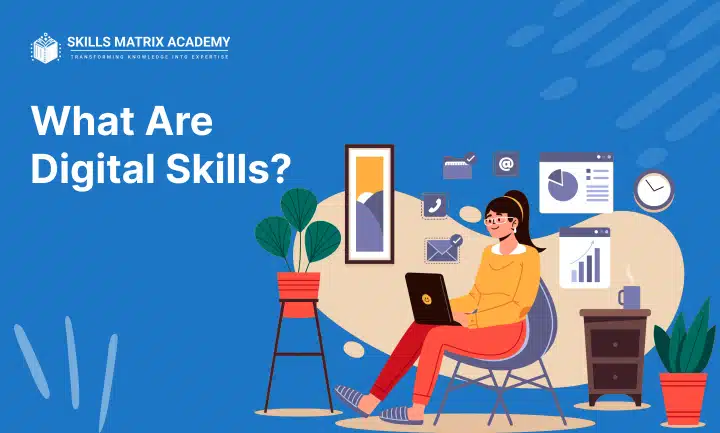
Before starting a career in the digital world, it’s important to know what digital skills are.
At the core, digital skills are the ability to use digital devices and technology fully. People spend hours online searching for products and services, and businesses need employees who can meet this digital skills requirement.
Students with digital skills have a clear advantage. These skills increase the chance of finding employment and unlock many digital career opportunities.
Key areas of digital skills include:
- Digital literacy – Knowing how to use computers and devices.
- Professional digital skills – Using business tools and software efficiently.
- Digital tools proficiency – Mastering apps, marketing software, and analytics.
- Online business skills – Selling and marketing online.
Mastering these skills helps students excel in a digital profession and adapt to the digital workplace. Understanding internet usage and performing effective online searches is important.
Investing in digital skills gives students a head start, making them competitive, versatile, and ready for tech-driven careers.
Ready to upskill? Let’s explore the top 10 digital skills for the workplace
1. Social Media
There are over 4.76 billion active social media users worldwide. People use 7.2 social networks on average per month. This number keeps growing.
Using social media effectively is a must for professionals.Social media marketing is more than posting updates on Facebook or LinkedIn. It’s about building strong connections between brands, influencers, and consumers. Businesses use social media to drive traffic to websites or products, which can lead to conversions.
Social platforms are also key for customer service. Customers ask questions, give feedback, and expect quick responses. A positive customer experience is vital.
A digital marketing course teaches YouTube marketing, TikTok marketing, and community engagement, preparing students for real-world challenges.
2. Search Engine Marketing (SEM)
Search Engine Marketing (SEM) is a top tool for digital marketers. Research by Nosto shows 81% of ecommerce leaders say rising costs make on-site search important. Many retailers fail due to irrelevant results, poor personalization, or friction.
Students with SEM skills can improve search visibility on Google and Bing through paid advertising. This brings organic search traffic while optimizing websites and ads for higher conversion rates.
The ecommerce industry may exceed $8 trillion by 2026. Job seekers with SEM knowledge are highly valuable. An SEO course teaches students to analyze results, optimize campaigns, and stay competitive.
3. Data Analytics
Data analytics is now essential.It’s not just collecting data. It’s about analyzing and using it to make smart decisions. Marketers track social media, website, and paid media data for a 360-degree customer view.
Companies want students with hands-on analytics experience. This helps measure success and optimize ROI.A digital marketing course teaches students to collect, interpret, and act on data, making smarter marketing decisions across all channels.
4. Content Marketing
Content marketing drives engagement and builds brands.It includes blogs, videos, podcasts, infographics, and social media content. Even with ads and SEO, content is central.
Good content increases brand awareness and positions businesses as thought leaders. Students must create content that matches keywords and SEO strategies.
A digital marketing course ensures students gain employable skills for content-focused roles.
5. Email Marketing

Email marketing remains very effective.It works for customer acquisition and retention. Startups and large companies use strategic campaigns for results.
Every step—from signup pages to welcome emails—needs careful planning. A good campaign increases engagement and builds long-term relationships.
Email addresses rarely change. Professionals skilled in email marketing strategy are in high demand. A digital marketing course teaches students to design and optimize email campaigns.
6. Mobile Marketing
Billions use smartphones. Mobile optimization is essential.By 2024, mobile ad spending will be 66% of digital ad budgets, with 82% coming from mobile apps.
AI, voice search, and AR/VR technologies are changing marketing—for example, PUMA BlackStation 2 metaverse at NY Fashion Week.
A digital marketing course teaches mobile trends, voice search optimization, and interactive technologies, making students highly employable.
7. Strategy & Planning
Businesses with a digital marketing strategy get better results.Analytics-driven campaigns with clear KPIs track success. Reviewing past campaigns shows what works.
DMI research says 79% of marketers see strategy as critical, yet it’s one of the hardest skills to find. A digital marketing course teaches planning and executing campaigns effectively.
8. Social Selling
Sales now happen online. Social selling works very well.65% of sellers generate half of their revenue this way. Companies use email tracking, productivity apps, and sales intelligence software.
Students learning social selling through a digital marketing course gain skills to succeed in competitive sales and marketing roles.
9. Pay-Per-Click (PPC) Marketing
PPC marketing gives quick results.Big companies appear on Google’s first page, while smaller businesses run targeted campaigns for ROI.
A successful PPC campaign needs:
- Website optimization
- Bidding strategy
- Budget planning
- Keyword research
- Compelling CTA
- Regular testing
Google Ads helps track impressions, reach, CPC, and budgets. A digital marketing course or SEO course teaches students to run PPC campaigns successfully.
10. Video Marketing
Video marketing boosts engagement and visibility.Platforms like YouTube, TikTok, and Instagram have strong influencers. Young users prefer WhatsApp, Weibo, and WeChat.
Video is easier than text. It appeals to Millennials and increases ad reach. A digital marketing course teaches students to use video effectively, engage audiences, and maximize results.
Tips to Learn Digital Skills Quickly
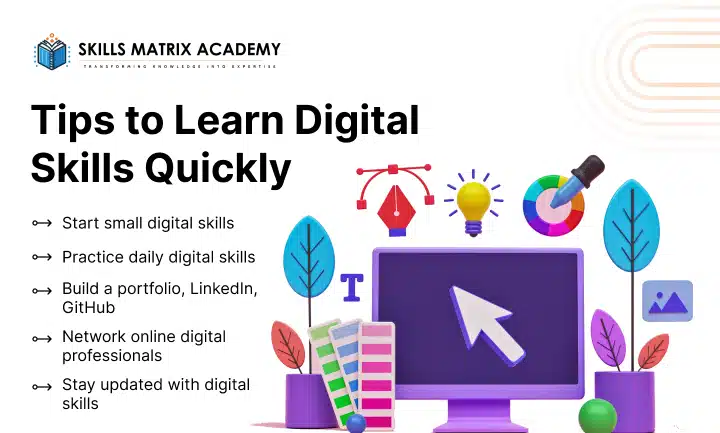
- Start small digital skills – Focus on one skill at a time to avoid overwhelm.
- Practice daily digital skills – 30 minutes per day builds proficiency.
- Build a portfolio, LinkedIn, GitHub – Show projects to impress employers.
- Network online digital professionals – Connect with mentors and peers.
- Stay updated with digital skills – Learn new tools and trends to stay relevant.
Why Learning Digital Skills Matters
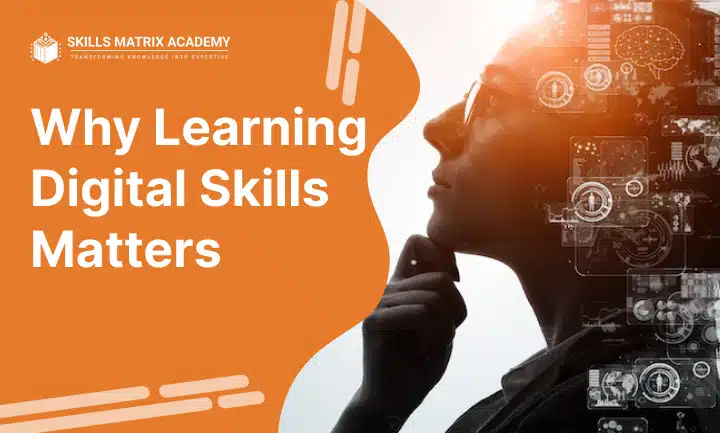
The job market is evolving fast. Employers want skills that deliver results, not just degrees.
Mastering the 10 digital skills makes students highly employable. Learning these skills before graduation gives a huge advantage. Employers value candidates who can contribute from day one.
Starting early provides early career growth. Skills such as digital marketing, SEO, web development, and AI offer numerous career opportunities.
Final Thoughts
The workplace is changing fast. Traditional education alone is not enough. Students need digital skills, hands-on projects, and networking. A digital marketing course or SEO course helps students learn digital skills quickly, become employable, and take charge of their careers.
Start today to prepare for the future of work. The sooner you begin, the faster you grow and succeed in the evolving job market.


